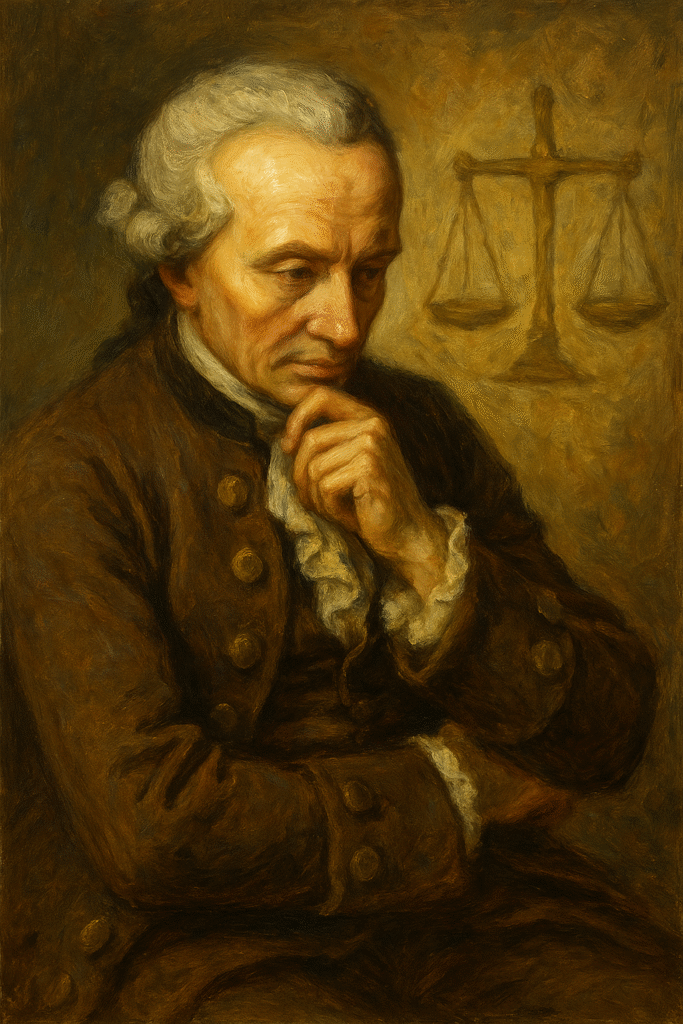Immanuel Kant, a pivotal 18th-century German philosopher, profoundly shaped modern ethical thought through his rigorous exploration of morality and rationality. His philosophy posits that moral obligations are derived not from subjective experiences or cultural norms but from reason itself. Central to his ethical framework is the Categorical Imperative, a principle that stipulates actions should conform to universalizable maxims. In simpler terms, an act is moral only if it can be applied consistently to all rational beings. Kant famously declared, “Act that your principle of action might safely be made a law for the whole world,” advocating for universal ethics that transcends individual and cultural differences, aiming for a universally applicable moral law.
Kant’s Moral Law in Historical Context
The emergence of Kant’s ideas occurred during the Enlightenment, a period characterized by a profound emphasis on reason and a challenge to traditional authoritative structures. Unlike prior consequentialist systems that valued outcomes over intention, Kant’s philosophy prioritized duty and moral intention above all. He boldly countered the moral relativism prevalent in his time by establishing a rational basis for ethics, particularly articulating his thoughts in Critique of Practical Reason and Groundwork of the Metaphysics of Morals. Here, Kant argued for absolute duties that should apply universally, solidifying his influence on discussions around human rights—a cornerstone of modern ethical discourse. His insistence on the inherent dignity of individuals resonates deeply in contemporary discussions on morality and ethics. (source: Plato)
Universal Ethics: Concepts, Arguments, and Challenges
What is Universal Ethics?
Universal ethics pursues a standardized, globally applicable moral framework that ensures consistency in ethical reasoning across different cultures and societies. Kant’s moral law exemplifies this pursuit, providing robust guidelines based on foundational universal principles.
Arguments for Universal Ethics
- Human Rights Foundation: Universal ethics acts as the bedrock of human rights, as evidenced by the Universal Declaration of Human Rights, which asserts inherent dignity and rights for all individuals irrespective of cultural background. This assertion mirrors Kant’s perspective that rationality undergirds universal moral reasoning and the moral law.
- Moral Consistency: By promoting consistency, universal ethics helps reduce moral ambiguity across various cultural standards. This consistency is essential for international relations, humanitarian endeavors, and effective global governance. For instance, during humanitarian crises, having a universally accepted ethical framework facilitates coordinated and effective responses.
- Rational Discourse: Universal ethics fosters rational dialogue about morality, engineering a shared ethical ground for mutual respect and understanding among differing cultures. In a globalized world, this is crucial for ensuring collaborative efforts in addressing moral conflicts.
Arguments Against Universal Ethics
- Cultural Relativism: Detractors argue that cultural contexts critically shape ethical norms, suggesting that a truly universal system may be unattainable. This view asserts that morality is culturally contingent and that ethical standards vary widely across societies.
- Ethical Pluralism: Advocates of ethical pluralism openly recognize the existence of multiple valid moral perspectives, arguing for the acceptance of diverse ethical approaches. This perspective emphasizes the richness of human experience and the necessity of reflecting this diversity in discussions about ethics.
- Risk of Ethical Imperialism: There is an inherent risk that imposing dominant cultural moral standards on marginalized groups may threaten their cultural autonomy, a situation often referred to as ethical imperialism. This risk highlights the importance of dialogue and understanding rather than unilateral ethical imposition.
Cultural Diversity and Ethical Standards
Cultural diversity introduces significant challenges and considerations in the pursuit of universal ethics. The varying historical, social, and spiritual backgrounds greatly influence ethical beliefs, making it essential to approach the topic thoughtfully.
- Case Studies (Kant’s Moral Philosophy):
- Global Humanitarian Aid: In various humanitarian aid scenarios, differing cultural beliefs regarding autonomy and consent can create significant ethical dilemmas. For instance, in certain cultures, the act of providing aid without prior consent may be viewed as disrespectful, complicating the aid process.
- Gender Norms: Consider the varying views on gender equality across cultures, many of which are deeply rooted in tradition. These different perspectives can lead to divergent ethical standards surrounding women’s rights, illustrating the complexities of universal ethics in relation to cultural specificity.
- Education and Dialogue: Engaging with cultural nuances and promoting education about global perspectives cultivates respect for diverse moral outlooks. Dialogue and mutual understanding can enhance attempts at establishing universal ethics, leading to collaborative frameworks that are inclusive.
- Moral Convergence: Despite the potential conflicts, many shared moral principles such as fairness, justice, and respect for individuals suggest a possibility of moral convergence. Thus, universal ethics need not be absolutist; rather, it can recognize and integrate diverse ethical landscapes.
Ethics in a Pluralistic Society: A Path Forward
Navigating the complexities of balancing universal principles with cultural diversity is essential in contemporary discourse. This undertaking could involve several key strategies:
- Inclusive Ethical Dialogues: Cross-cultural discussions about moral experiences can illuminate universally applicable principles while ensuring respect for contextual nuances. These dialogues are instrumental in discerning shared values.
- Adaptable Ethical Frameworks: Developing ethical frameworks that allow for cultural specificity within universal principles is crucial. Such frameworks can involve flexible mechanisms that embrace local norms while maintaining core ethical standards.
- Interdisciplinary Approaches: Integrating insights from anthropology, sociology, and philosophy can reveal new ethical understandings rooted in both shared humanity and cultural diversity. This comprehensive perspective fosters richer discussions about morality.
- Global Collaboration: Platforms for international collaboration, such as global ethics councils, can facilitate the establishment of agreements on fundamental ethical principles while honoring cultural differences. Such initiatives show promise in harmonizing diverse ethical perspectives across borders.
The Future of Universal Ethics
As the world becomes increasingly interconnected, the concept of universal ethics is more relevant than ever. Future ethical frameworks will likely evolve to address the complexities posed by globalization, technology, and environmental issues.
Emerging Trends
Predictably, we might see increasing attention on how universal ethics can inform responses to global challenges such as climate change, technological advancement, and international human rights violations. For instance, understanding ethical responsibilities in a digitally connected world could lead to innovative approaches to privacy, data use, and consent.
The challenge facing universal ethics today is not only to remain relevant but also to adapt and respond effectively to a rapidly changing global landscape.
Conclusion
While the aspiration to establish universal ethics is noble, it reveals intricate complexities, particularly in culturally diverse societies. Kant’s philosophy lays a foundational groundwork for exploring these complexities, while contemporary discussions around cultural diversity illuminate potential pathways toward a culturally inclusive and ethically robust framework for understanding morality in our interconnected world.
FAQ Section
What is Kant’s Categorical Imperative?
Kant’s Categorical Imperative is a pivotal philosophical concept positing that one should act only according to maxims that can be universally adopted, thus evaluating moral actions based on their potential universality and the principles underlying them.
Can universal ethics coexist with cultural diversity?
Yes, universal ethics can coexist with cultural diversity. Achieving this coexistence requires finding common ethical ground while respecting the cultural contexts specific to different societies. Constructive dialogues that honor both universal principles and local moralities are essential for this integration.
What are contemporary challenges to universal ethics?
Contemporary challenges include cultural relativism, the risk of ethical imperialism, and the complexity of addressing divergent moral perspectives in an increasingly globalized environment, requiring nuanced approaches to ethical discourse.
How does Kantian ethics apply to current global issues?
Kantian ethics emphasizes rationality and an inherent respect for individuals, which can significantly inform current global issues like human rights advocacy, international law, and humanitarian responses, all of which demand respect for the dignity of individuals regardless of their cultural backgrounds.
Why is it important to discuss universal ethics today?
Engaging in discussions around universal ethics is crucial in our interconnected world as it helps to mitigate ethical conflicts, guides international relations, and promotes a more equitable society rooted in shared respect for human dignity, fostering a more harmonious global community.
Are there alternatives to Kantian ethics?
Certainly, there are alternatives to Kantian ethics, including consequentialist approaches that focus on the outcomes of actions and virtue ethics that emphasize the moral agent’s character. Each presents differing perspectives on ethical reasoning and moral philosophy, enriching the discourse on ethics overall.


